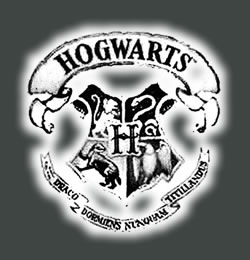 The apprentice sorcerers are also consumers who dream of acquiring all sorts of high-tech magical objects, including high-performance wands or the latest brand-name flying brooms, manufactured by multinational corporations. The apprentice sorcerers are also consumers who dream of acquiring all sorts of high-tech magical objects, including high-performance wands or the latest brand-name flying brooms, manufactured by multinational corporations.
Hogwarts, then, is not only a school, but also a market: subject to an incessant advertising onslaught, the students are never as happy as when they can spend their money in the boutiques near the school. There is all sorts of' bartering between students, and the author heavily emphasizes the possibility of social success for young people who enrich themselves thanks to trade in magical products. The tableau is completed by the ritual complaints about the rigidity and incompetence of bureaucrats. Their mediocrity is starkly contrasted with the inventiveness and audacity of some entrepreneurs, whom Rowling never ceases to praise. For example, Bill Weasley, who works for the goblin bank Gringotts, is presented as the opposite of his brother, Percy the bureaucrat. The first is young, dynamic and creative, and wears clothes that "would not have looked out of place at a rock concert"; the second is unintelligent, obtuse, limited and devoted to state regulation, his career's masterpiece being a report on the standards for the thicknesses of cauldrons. We have, then, an invasion of neo-liberal stereotypes in a fairy tale. The fictional universe of Harry Potter of offers a caricature of the excesses of the Anglo-Saxon social model: under a veneer of regimentation and traditional rituals, Hogwarts is a pitiless jungle where competition, violence and the cult of winning run riot. The psychological conditioning of the apprentice sorcerers is clearly based on a culture of confrontation: competition among students to be prefect; competition among Hogwarts "houses" to gain points; competition among sorcery schools to win the Triwizard tournament; and, ultimately, the bloody competition between the forces of Good and Evil. This permanent state of war ends up redefining the role of institutions: faced with ever-more violent conflicts, they are no longer able to protect individuals against the menaces that they face everywhere. The Minister of Magic fails pitifully in his combat against Evil, and the regulatory constraints of school life hinder Harry and his friends in defending themselves against the attacks and provocations that they constantly encounter. The apprentice sorcerers are thus alone in their struggle to survive in a hostile milieu, and the weaker, like Harry's schoolmate Cedric Diggory, are inexorably eliminated. These circumstances influence the education given the young students of Hogwarts. The only disciplines that matter are those that can give students an immediately exploitable practical knowledge that can help them in their battle to survive. That's not astonishing, considering how this prestigious school aims to form, above all, graduates who can compete in the job market and fight against Evil. Artistic subjects are thus absent from Hogwarts's curriculum, and the teaching of social sciences is considered of little value: the students have only some tedious courses of history. It's very revealing that Harry finds them "as boring as Percy's cauldron-bottom report." In other words, in the cultural universe of Harry Potter, social sciences are as useless and obsolete as state regulation. Harry Potter, probably unintentionally, thus appears as a summary of the social and educational aims of neo-liberal capitalism. Like Orwellian totalitarianism, this capitalism tries to fashion not only the real world, but also the imaginations of consumer-citizens. The underlying message to young fans is this: You can imagine as many fictional worlds, parallel universes or educational systems as you want, but they will still all be regulated by the laws of the market. Given the success of the Harry Potter series, several generations of young people will be indelibly marked by this lesson. Ilias Yocaris is a professor of literary theory and French literature at the University Institute of Teacher Training in Nice. This article was translated from the French. | 










 The apprentice sorcerers are also consumers who dream of acquiring all sorts of high-tech magical objects, including high-performance wands or the latest brand-name flying brooms, manufactured by multinational corporations.
The apprentice sorcerers are also consumers who dream of acquiring all sorts of high-tech magical objects, including high-performance wands or the latest brand-name flying brooms, manufactured by multinational corporations.